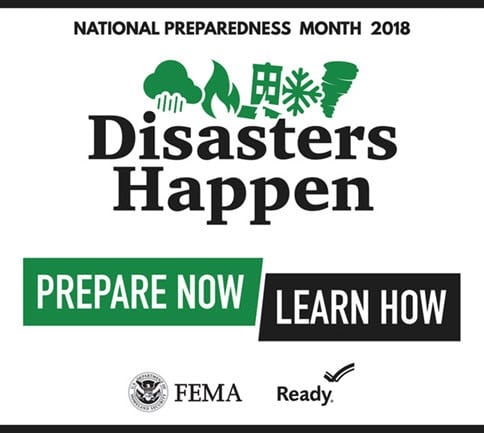National Preparedness Month, September 2018
September 1st, 2018 marks the beginning of National Preparedness Month with this year’s theme being “Disasters Happen. Prepare Now. Learn How.” with September 15th being designated as National Day of Action.
Disasters can happen anytime and anywhere and can include a wide range of emergencies such as active shooter, bioterrorism, chemical emergencies, cybersecurity, droughts, earthquakes, explosions, extreme heat, floods, HAZMAT incidents, house fires, household chemical emergencies, hurricanes, landslides, nuclear explosions, pandemics, severe weather, snow storms & extreme cold, tornadoes, tsunamis, volcanoes, and wildfires.
This month is a great opportunity for individuals and families to make and practice emergency plans, learn life saving skills, review insurance coverage, and begin saving for an emergency. Visit the Department of Homeland Security website at https://www.ready.gov/september for access to additional tools and resources to help prepare for emergencies.
Emergency Plan:
- Emergency Alerts:
- Know how you are getting notified of potential emergencies in your area. Sign up for other new alert apps in your area.
- Wireless Emergency Alerts (WEA) via cell phone/electronic device (check with your service provider to determine if your phone is WEA capable
- Emergency Alert System broadcasting
- NOAA weather radio
- Plan for Shelter:
- The plan for shelter will vary depending on the type of emergency. See the following site for recommendations based on emergency type. https://www.ready.gov/be-informed
- Mass Care Shelter – in some cases, it may be necessary to leave your home and move to a mass care shelter. If able, you should take any supplies/provisions with you. To find open shelters near you, you can text SHELTER with your zip code to 43362.
- Shelter in Place – in some situations it is best to stay where you are. Depending on the situation, you may also need to ‘seal the room’ by blocking as much air flow from outside as possible.
- Monitor TV/radio/internet often for official or new instructions as they become available
- Evacuation:
- Where will you go and how will you get there if you need to evacuate? Identify several places you might be able to evacuate to in different directions. Be familiar with alternate routes.
- Develop a family/household communication and re-unification plan
- Have supplies set aside readily accessible should you need to evacuate
- If an evacuation seems likely, keep your car’s gas tank full, otherwise keep at least half a tank of gas in the event of an unexpected need to evacuate. *Note that gas stations may be closed and unable to pump gas, or may not accept credit/debit cards. If you do not own a vehicle, have another plan in place for evacuation.
Life Saving Skills:
- Know basic home maintenance to protect against flood damage or impacts of earthquakes
- Learn how to turn off utilities
- Install smoke alarms, test them monthly, and replace every 10 years
- Learn life-saving skills such as CPR, stop the bleed, basic first aid, or participate in Community Emergency Response Team training (https://www.ready.gov/community-emergency-response-team)
- Other tips include having Carbon Monoxide detectors, having enough flashlights/batteries, stocking an emergency supply kit.
Reviewing Insurance Coverage:
- The aftermath of a natural disaster can leave many people in a financial bind. Renters, homeowners, and even vehicle insurance can help offset much of the financial burden caused by a natural disaster. Take this opportunity to review which types of disasters you might be likely to have specific to your location and review your insurance policies, or investigate potential insurance providers.
Saving for an Emergency:
- Take some time to make digital copies of any important documents and save them on a ‘cloud’ or secure cell phone/web based app.
- Start looking at finances, and begin an emergency savings account to help support you/your family should a disaster strike. Set aside a small amount of your paycheck to add to the emergency fund.
- Keep some cash on hand and easily accessible should a disaster happen. Keep in mind that ATM machines/credit card machine may not be working.
Be Prepared for the Unknown … Act Now!





